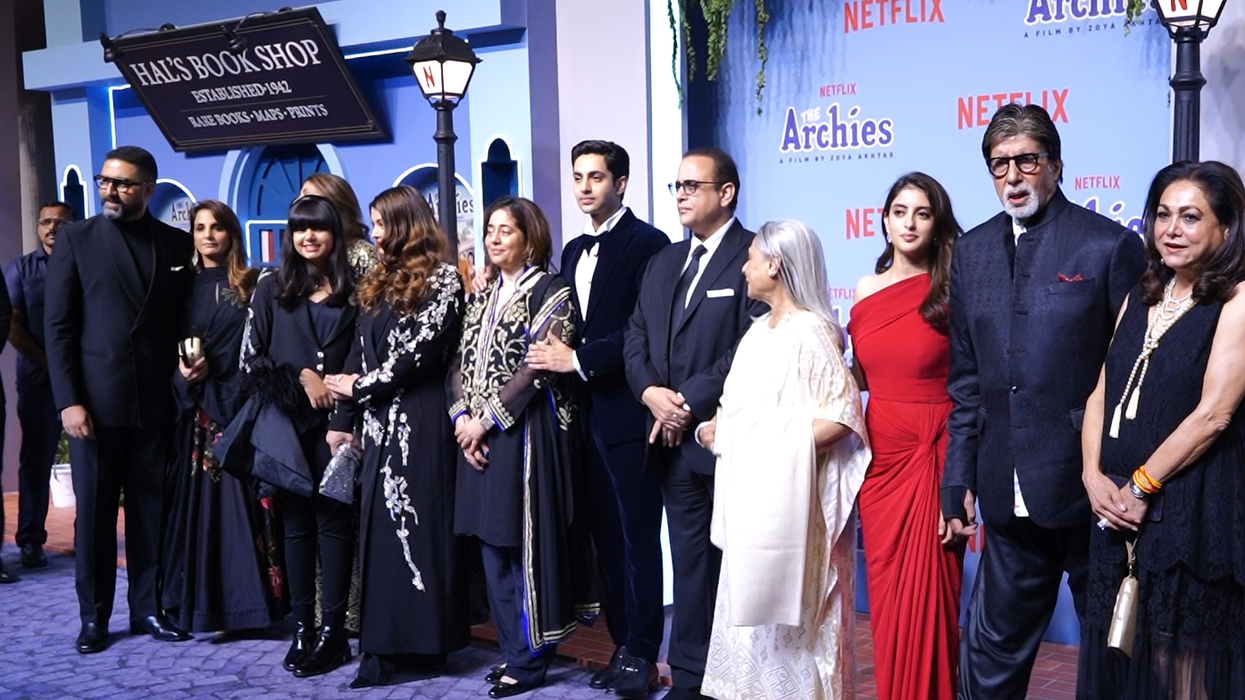Megastar Amitabh Bachchan could not be happier as his grandson Agastya Nanda is set to enter the cinematic world with the film The Archies.
On Tuesday, director Zoya Akhtar hosted a special screening of The Archies in Mumbai, where the who's who of Bollywood marked their presence. Big B, too, came to the screening and turned out to be the biggest cheerleader of Agastya.
Not only Big B but his wife Jaya Bachchan, son Abhishek Bachchan, daughter Shweta Bachchan, daughter-in-law Aishwarya Rai Bachchan, son-in-law Nikhil Nanda, granddaughters Navya and Aaradhya also attended the screening.
The whole family arrived in style and happily posed for the paps on the red carpet.
Apart from Agastya, Navya and Jaya Bachchan, the whole family twinned in black. Big B and Abhishek wore a black suit. Aishwarya stood out in a stunning blazer dress. Aaryadhya also opted for a blazer-styled dress. Shweta looked gorgeous in a black and golden gown. Jaya Bachchan looked elegant in an off-white ensemble.
Agastya, who is one of the lead actors in 'The Archies', chose to wear a blue velvet blazer paired with pants. His sister looked exquisite in a red gown.
Before attending the premiere, Agastya's mother Shweta posted a special picture of Agastya with Abhishek and Amitabh Bachchan.
In the picture, Abhishek is seen helping Agastya get ready for his big day.
Shweta captioned the post with a white heart emoji.
The post has been flooded with congratulatory messages for Agastya.
"Our boy begins his journey today," filmmaker Karan Johar commented.
Actor Sonali Bendre dropped a string of red heart emojis in the comment section.
The screening was also attended by Shah Rukh Khan and his family, Ranbir Kapoor, Karan Johar, Neetu Kapoor, Hrithik Roshan, Saba Azad, Rekha, Shilpa Shetty, Ibrahim Khan, Sonali Bendre, Atlee, Ranveer Singh, Katrina Kaif and Janhvi Kapoor among others.
Helmed by Zoya Akhtar, The Archies also marks the debut of SRK and Gauri Khan's daughter Suhana Khan, late Sridevi and producer Boney Kapoor's daughter Khushi Kapoor.
The film is a coming-of-age musical, which follows the lives of Archie, Betty, Veronica, Jughead, Reggie, Ethel, and Dilton who will take audiences to the fictional hilly town of Riverdale. The film explores friendship, freedom love, heartbreak, and rebellion.
The film will be out on Netflix on December 7.




